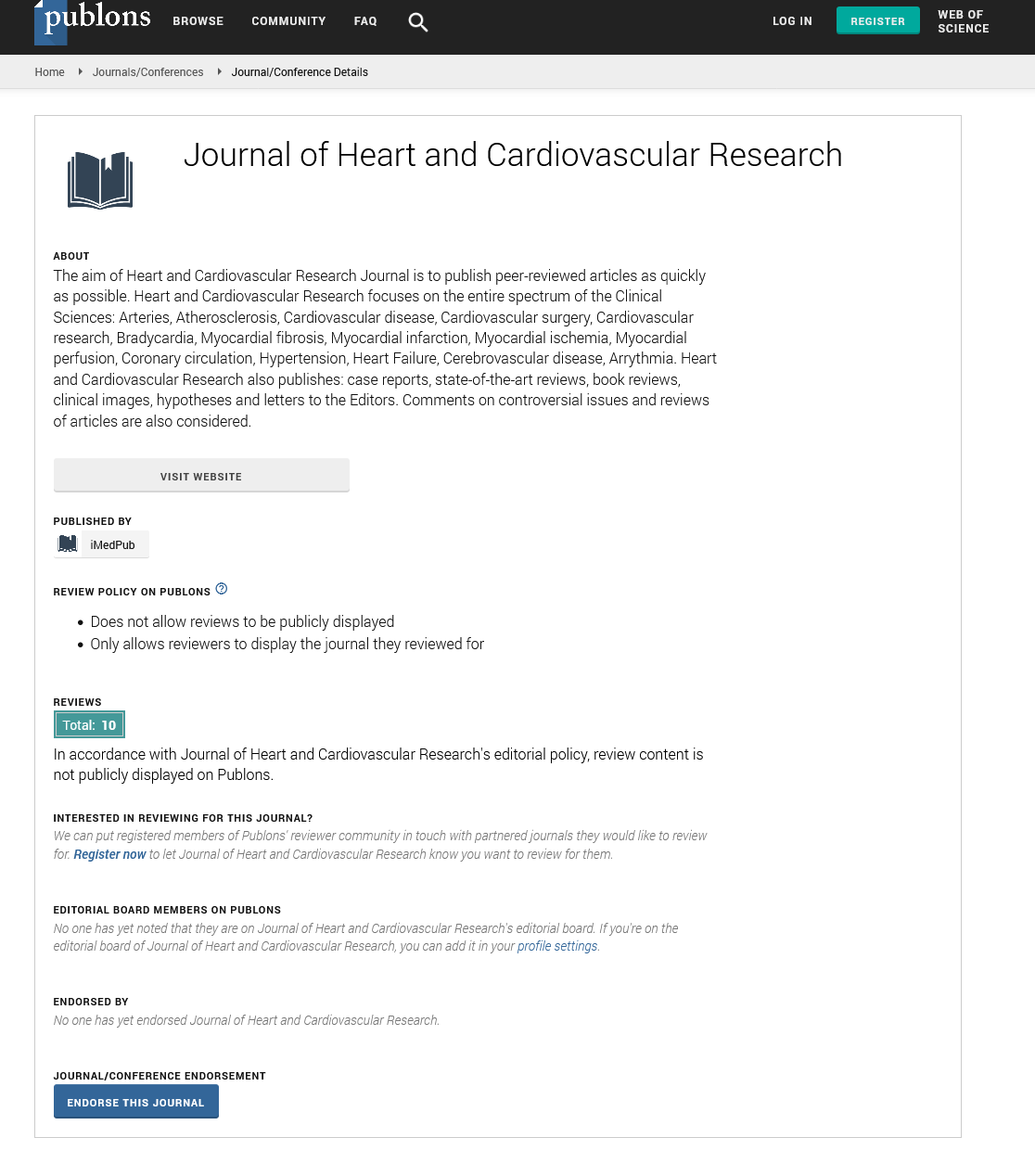ISSN : ISSN: 2576-1455
Journal of Heart and Cardiovascular Research
Abstract
Heart Congress 2018: The impact of anxiety and depression on PCI patients and the effectiveness of mindfulness-based intervention - Xiao Hua Wang - Soochow University
Aim: Theaim of the study was to explore the impact of anxiety and/or depression on prognosis among CAD patients with stent implantation and to find an intervention to improve symptoms of anxiety and depression for this kind of patients.
The specific objectives include: 1) To explore the impact of anxiety and depression on MACEs in Chinese CAD patients after stent implantation; 2) To confirm the effectiveness of a six weeks, one-on-one, face-to-face combined with phone-delivered multiform mindfulness-based stress reduction (mMBSR) on the improvement of anxiety, depression, and stress in Chinese CAD patients with stent implantation. Mindfulness is defined as the capacity to intentionally be in the present moment without judgement. Two of the main mindfulness-based approaches, which aim to cultivate mindfulness therapeutically, include Mindfulness-Based Stress Reduction (MBSR), and Mindfulness-Based Cognitive Therapy (MBCT). MBSR is a structured, manualised treatment programme originally developed for the management of chronic pain and now used widely to reduce psychological morbidity associated with chronic illnesses and to treat emotional and behavioural disorders . MBCT, derived from MBSR, was designed for people with a history of recurrent depression to help prevent future recurrences . The standard practice for both therapies is a group-based programme held over 8–10 weeks, with a weekly two hour session, inclusion of daily homework in the practice of mindfulness and a one day retreat. MBSR and MBCT have been demonstrated to be effective therapies to treat anxiety and depression, in both clinical and non-clinical populations. A meta-analysis on the effects of MBSR on mental health of adults with chronic disease showed small but positive effects on depression anxiety and psychological distress . In addition, MBSR may also improve physiological aspects of vascular disease . Indeed, randomised controlled studies of MBSR intervention have been shown to reduce blood pressure in low-income African-American older adults , and in community dwelling participants with stress related complaints.
In vascular disease, pilot and observational studies of MBSR and MBCT intervention have been associated with improvements in perceived health, quality of life and physiological responses in stroke survivors ,and in reductions of patient reported diabetes-related distress . MBSR has also been associated with lowered blood pressure and better glycaemic control in patients with diabetes . However, with a predominance in the evidence base of small non-randomised studies, the efficacy and treatment effects are as yet to be fully understood. The purpose of this systematic review was to establish whether MBSR and MBCT are effective in the management of both depressive and physical symptoms in individuals with vascular disease and those at high risk of vascular disease. Methods: Part 1: The impact of anxiety and depression on cardiovascular events of patients with coronary artery stent implantation: Patients who were diagnosed CAD for the first time and met the established criteria were recruited from The First and Second Affiliated Hospital of Soochow University, The Affiliated Hospital of Jiangnan University and The Affiliated Hospital of Nantong University between June 2015 and May 2016. Part 2: The effectiveness of mMBSR on anxiety and depression in CAD patients with coronary artery stent implantation: A randomized controlled trial including 70 patients who met the established criteria recruited within 1-4 days after coronary stent implantation from the First Affiliated Hospital of Soochow University between 22 June 2016 and 4 January 2017 and were randomized equally to experimental or control group. Patients in experimental group received a six-weeks, one-on-one, face-to-face combined with phone-delivered MBSR intervention, while patients in control group received routine care. The levels of anxiety, depression, stress and mindfulness were compared between the two groups before and after intervention. The mediating role of mindfulness in the effects of MBSR on improvement of anxiety, depression and stress was analyzed. Results: Part 1: A total of 328 copies of the initial questionnaire were collected. Among those collected, 19 were excluded, and the remaining 309 were considered valid; the effective recovery rate was 94.21%. 100 patients (32.36%) had anxiety, 80 (25.89%) had depression, and 56 (18.12%) had anxiety combined with depression.
Author(s): Xiao Hua Wang
Abstract | PDF
Share This Article
Google Scholar citation report
Citations : 34
Journal of Heart and Cardiovascular Research received 34 citations as per Google Scholar report
Journal of Heart and Cardiovascular Research peer review process verified at publons
Abstracted/Indexed in
- Google Scholar
- Sherpa Romeo
- China National Knowledge Infrastructure (CNKI)
- Publons
Open Access Journals
- Aquaculture & Veterinary Science
- Chemistry & Chemical Sciences
- Clinical Sciences
- Engineering
- General Science
- Genetics & Molecular Biology
- Health Care & Nursing
- Immunology & Microbiology
- Materials Science
- Mathematics & Physics
- Medical Sciences
- Neurology & Psychiatry
- Oncology & Cancer Science
- Pharmaceutical Sciences
